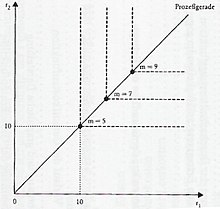Limitation (economics)
In economics , limitation is understood to mean the limitation of the exchange of factors in production or of goods in consumption to a fixed exchange relationship ( Leontief production function , Gutenberg production function ). It is the opposite of substitution , which, given any divisibility of the factors, contains an infinite number of exchange relationships.
Examples
A parts list or a recipe are limited production functions. Different goods cannot be exchanged for one another. Mathematically, this exchange is possible, but it is not feasible.
Example: bakery
- A bread consists of very specific ingredients. The bread is only made by combining the right amounts of these ingredients. If you lower z. B. the amount of flour and increases the amount of salt (swap flour for salt) the bread becomes inedible.
Example: automotive engineering
- A car is a combination of very specific production factors . Using 200 small screws instead of a steering wheel, for example, would be pointless.
For each output quantity (e.g. m = 5) there is only one possible efficient combination of factors (e.g. r1 = 10, r2 = 10), so that the isoquants can be represented in the form of individual points. The geometric connection of all efficient factor combinations is called a process line. It is characteristic of limiting production processes that there is no difference between several combinations of factors ( factor substitution ), but only between several production processes, each with a combination of inputs - e.g. B. by changing the manufacturing machine - can be distinguished ( process substitution ).
